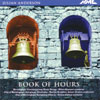Anderson Book of Hours
Strongly personal works from Julian Anderson's Birmingham years
View record and artist detailsRecord and Artist Details
Composer or Director: Julian Anderson
Genre:
Orchestral
Label: NMC
Magazine Review Date: 11/2006
Media Format: CD or Download
Media Runtime: 80
Mastering:
Stereo
DDD
Catalogue Number: NMCD121

Tracks:
| Composition | Artist Credit |
|---|---|
| Eden |
Julian Anderson, Composer
City of Birmingham Symphony Orchestra Julian Anderson, Composer Martyn Brabbins, Conductor |
| Imagin'd Corners |
Julian Anderson, Composer
City of Birmingham Symphony Orchestra Julian Anderson, Composer Sakari Oramo, Conductor |
| (4) American Choruses |
Julian Anderson, Composer
City of Birmingham Symphony Orchestra Chorus Julian Anderson, Composer Simon Halsey, Conductor |
| Symphony |
Julian Anderson, Composer
City of Birmingham Symphony Orchestra Julian Anderson, Composer Sakari Oramo, Conductor |
| Book of Hours |
Julian Anderson, Composer
Birmingham Contemporary Music Group Julian Anderson, Composer Lamberto Coccioli, Live electronics Oliver Knussen, Conductor Scott Wilson, Live electronics |
Author: Arnold Whittall
This, the magnificent follow-up to the recent Ondine Julian Anderson disc (9/06), contains the five works he wrote for Birmingham forces during his years as CBSO composer-in-association (2001-5). The recordings were made at different times in different places but the strongest impression is of a group of compositions exploring closely related ideas and beliefs.
The opening of the Symphony is emblematic, evolving from attenuated noises to the trills, arabesques and fanfares of a pastoral dawn-music. You might pick up hints of Tippett’s Ritual Dances, Nicholas Maw’s Odyssey, even of Ravel’s Daphnis et Chloé. But the music never falls back on simple imitation, and while it seems to share Tippett’s modern construction of Utopia – of aspiration inseparable from uncertainty and doubt – the subtle intricacy of Anderson’s approach to harmony, and to the interplay between tempered and non-tempered tunings, reinforces its strongly personal, authentically contemporary quality.
Similar images are powerfully projected at the end of Book of Hours for instrumental ensemble and live electronics, when an artless, folklike tune is challenged by much darker, denser materials, and again in the shorter orchestral works Eden and Imagin’d Corners. In all these scores the luminous yet abrasive resonance of the textures counters the risks of old-style pastoral complacency.
As John Fallas’s well informed notes point out, Anderson’s is not an escapist vision of Utopia. Hope is always “uncertain”, and in the Four American Choruses, setting verses from Ira Sankey’s evangelical hymns collection, the music seems to question as much as to endorse the simple religious sentiments of the texts.
Even if these works receive more polished performances in future years, the present recordings are all special in the imagination and excitement they convey.
The opening of the Symphony is emblematic, evolving from attenuated noises to the trills, arabesques and fanfares of a pastoral dawn-music. You might pick up hints of Tippett’s Ritual Dances, Nicholas Maw’s Odyssey, even of Ravel’s Daphnis et Chloé. But the music never falls back on simple imitation, and while it seems to share Tippett’s modern construction of Utopia – of aspiration inseparable from uncertainty and doubt – the subtle intricacy of Anderson’s approach to harmony, and to the interplay between tempered and non-tempered tunings, reinforces its strongly personal, authentically contemporary quality.
Similar images are powerfully projected at the end of Book of Hours for instrumental ensemble and live electronics, when an artless, folklike tune is challenged by much darker, denser materials, and again in the shorter orchestral works Eden and Imagin’d Corners. In all these scores the luminous yet abrasive resonance of the textures counters the risks of old-style pastoral complacency.
As John Fallas’s well informed notes point out, Anderson’s is not an escapist vision of Utopia. Hope is always “uncertain”, and in the Four American Choruses, setting verses from Ira Sankey’s evangelical hymns collection, the music seems to question as much as to endorse the simple religious sentiments of the texts.
Even if these works receive more polished performances in future years, the present recordings are all special in the imagination and excitement they convey.
Discover the world's largest classical music catalogue with Presto Music.

Gramophone Digital Club
- Digital Edition
- Digital Archive
- Reviews Database
- Full website access
From £8.75 / month
Subscribe
Gramophone Full Club
- Print Edition
- Digital Edition
- Digital Archive
- Reviews Database
- Full website access
From £11.00 / month
Subscribe
If you are a library, university or other organisation that would be interested in an institutional subscription to Gramophone please click here for further information.




